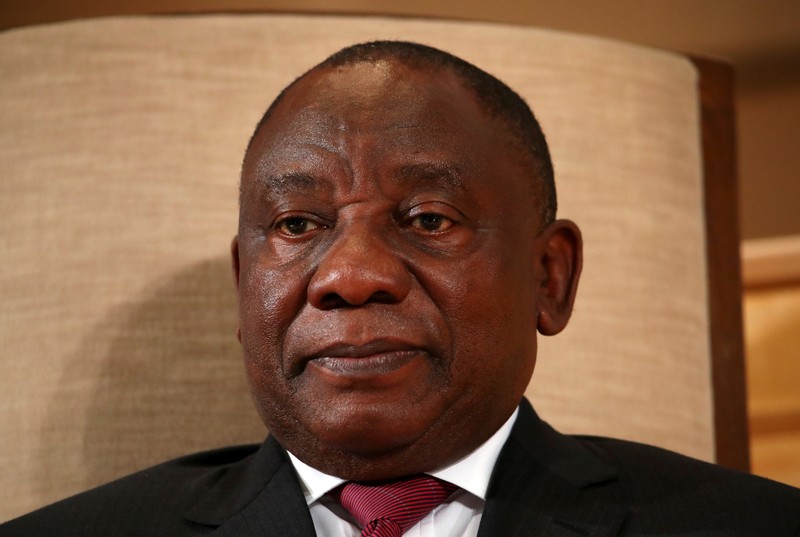
FILE PHOTO: South African President Cyril Ramaphosa attends the opening day of the International Labour Organization’s annual labour conference in Geneva, Switzerland June 10, 2019. REUTERS/Denis Balibouse/File Photo
September 5, 2019
By Wendell Roelf and Alexander Winning
CAPE TOWN (Reuters) – South African ministers promised on Thursday to tackle the prejudice fuelling a wave of riots and xenophobic attacks, as growing international anger over the violence overshadowed a pan-African economic conference in Cape Town.
President Cyril Ramaphosa had hoped the World Economic Forum summit would serve as a shop window for his efforts to revive South Africa’s ailing economy and boost intra-African trade.
But a week of violence that has killed at least seven people and led to hundreds of arrests has all but eclipsed proceedings.
Government officials have up to now largely blamed the attacks on criminals. But Foreign Minister Naledi Pandor acknowledged some of it was being driven by “Afrophobia” – resentment of other Africans living and working there.
While the victims’ nationalities have not been made public, the rioting, and reprisal attacks, have above all exposed tensions between the host country and Nigeria, the continent’s two biggest economies.
On Thursday Jim Ovia, chairman of Nigeria’s Zenith Bank and a co-chair of the whole Cape Town event, withdrew, citing the “hypersensitivity of the issues surrounding the lives and well-being of Nigerian citizens living in South Africa.”
Nigeria, whose vice president had boycotted the summit on Wednesday, also recalled its High Commissioner to South Africa.
Foreign Minister Pandor said the government was working to restore calm and was in constant contact with Nigerian authorities.
“There is a targeting of Africans from other parts of Africa, we can’t deny that,” she told Reuters on the sidelines of the conference. “But, there is also criminality.”
The government would look at school curricula to tackle “problematic attitudes” and contact community groups to see what role they could play, she said.
RIOTS, DEATHS
The riots began eight days ago in Pretoria before spreading to nearby Johannesburg. Both cities, in Gauteng province, have large immigrant populations.
Police on Thursday reported 15 associated deaths since then, of which Gauteng police commissioner Elias Mawela confirmed seven were directly linked to the violence.
Police had also made 423 arrests. Asked about the victims’ nationalities, he said that “has been taken to the pathologist.”
In Democratic Republic of Congo’s second city Lubumbashi, residents protested outside the South African consulate and a South African-owned shop was looted, witnesses told Reuters on Thursday.
Some commercial links were also affected.
Tanzania’s national carrier suspended flights from the commercial capital Dar es Salaam to Johannesburg on Thursday, citing ongoing violence that it said was a risk to its passengers.
In neighboring eSwatini, the National Agricultural Marketing Board said trucks that normally carry farm produce south across the border were being kept in their depot after advice from South African counterparts that it was not safe to travel.
“We are keeping our fingers crossed that things will normalize by next week,” said NAMBoard Agribusiness Manager Tammy Dlamini.
Earlier in the day, Ramaphosa canceled his appearance at the WEF plenary session to address a crowd protesting for a second day about violence against women.
Speaking in his place, Finance Minister Tito Mboweni said most South Africans disapproved of attacks on foreigners and the principle of freedom of movement for the continent’s citizens was key.
But animosities were generating violence, and politicians were partly responsible. “We have to go to our people politically to discuss what some of them are doing is wrong.”
Central Bank data on Thursday showed South Africa’s trade balance swung to a deficit in the second quarter while the current account deficit widened.
The economy grew more than forecast in the same period but it had contracted sharply in the previous three months, and the heads of two local financial firms said on Thursday that a meaningful recovery was years away.
(Reporting by Wendell Roelf and Alexander Winning; additional reporting by Mfuneko Toyana, Tanisha Heiberg and Emma Rumney in Johannesburg, Felix Onuah in Abuja, Lunga Masuku in Mbabane, Stanis Bujakera in Kinshasa and Fiston Mahamba in Goma; writing by John Stonestreet and Andrew Heavens; editing by Olivia Kumwenda-Mtambo)

